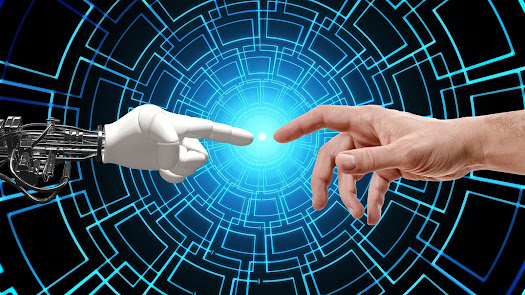The Consecration of AI and Human Stupidity, by D. Conterno (2019)
The following
analysis of the evolution of both AI and human stupidity is based on
established scientific studies and should be seriously considered. As business
workers and leaders, we have an ethical and moral duty to fully grasp the
consequences of our actions, their social and human impacts and integrate any
corrective actions required in our operations. Thus, we will be creating more
positive values in our enterprises and our societies.
In 1968, the
esteemed film director Stanley Kubrick released one of his masterpieces called
"2001, a space odyssey". For the 1st time in modern history, the
danger of a wrong AI implementation was raised to the general public. As the
Discovery One spaceship's AI computer, HAL 9000, states when its 'intelligent'
modules are removed by the astronaut David Bowman, its mistakes were
attributable to human errors. As HAL's core program was not based on sound
values, it became confused due to its prime directives and developed a
Hofstadter-Moebius loop that killed most of the spaceship crew. Using the game
theory, HAL was programmed using a zero-sum (win-lose) implementation that led
it to deceptive and murdering tendencies rather than a non-zero-sum one
(win-win) that would have allowed it to work collaboratively with the Discovery
One crew.
In as much AI could
create new hurdles for humankind, it could also assist in creating a more
harmonious world as it could benefit not just the business world but also the
political world. Given the ineffective governments and organisations thriving
throughout the world, many philosophers, scientists and visionaries have often
declared that we ought to use AI to conduct the political coordination of our
societies.
Within the next two
decades, it is estimated that machines will take 47% of all employment. This
percentage may be very conservative as we do not know where scientific AI
discovery and improvement will take us. All traditional sectors such as
healthcare, education, factory, security and generally even management will be
significantly affected. AI could lead to a more significant change in our
societies as, for example, today's automation of blue-collar activities will
eventually be followed by an impact on current white-collar workers, thus creating
a new workforce required to be intelligent. As Paul Daugherty, Accenture Chief
Technology and Innovation Office, stated "To realise the opportunity of
AI, it is critical that businesses act now to develop strategies around AI that
put people at the centre, and commit to developing responsible AI systems that
are aligned to moral and ethical values that will drive positive outcomes and
empower people to do what they do best—imagine, create and innovate.". The
construction of a new world work organisation has to take place now if we want
to implement fast and required social changes to ensure that transitions are
undertaken with no or minimum social frictions. The introduction of universal
credits, for example, becomes more of a must today than ever as the number of
people out of work or people who may never work will dramatically increase. The
reality of today's world political scenery is that it is far to be ready to
take on this challenge.
When writing about
AI, one cannot stop thinking about the financial benefits the AI technologies
will bring, hopefully to humanity rather than a very few people and
corporations. Many studies have been released in the last few years. They have
in common the recognition of how significant AI will financially become in the
years to come. However, they tend to develop quite different financial
projections, even though they are all astonishing. Accenture, for example,
stated that by 2035, AI would have the potential to boost profitability rates
by an average of 38%. This should lead to an economic boost of $14 (American)
trillion across 16 industries in 12 economies. The number one sector will be
the Information and Communication industry. Integrating AI into legacy
information and communication systems will quickly deliver high cost, time and
process-related savings.
The critical point
is that AI definitions may vary from one research source to another and thus
impact any projected figures. For example, Tractica defines AI under an
umbrella containing the following technologies: machine learning, deep
learning, computer vision, natural language processing, machine reasoning and
strong AI. For this article, we have used figures that may be perceived to be
conservative, but that bring to the point on how beneficial AI maybe, home.
In the more immediate future, we can expect, according to IDC's (International Data Corporation) new spending guide, that with the widespread adoption of cognitive systems, worldwide revenues will rise from $8 billion in 2016 to an estimated $47 billion in 2020. The primary industries investing in AI are in this order: banking, retail, healthcare and finally, discrete manufacturing. These four industries amount to no less than half of all AI revenues for 2016, with banking and retail reaching $1.5 billion. This trend for healthcare will significantly grow to a CAGR (compound annual growth rate) 0f 69.3% by the time we reach 2020. North America (the United States and Canada) is the largest region for AI spending, with 2016 revenues approaching $6.2 billion. Europe, the Middle East and Africa (EMEA) will remain the second largest region throughout the forecast. Still, AI revenues from Asia/Pacific, including Japan, will nearly close the gap with EMEA by 2020. Tractica's forecast up to 2025 reaches $105.8 billion.
The future for AI
looks extremely good…. At least from a forecast financial point of view.
However, these aspects that urgently need addressing:
- The core
programming, moving from zero-sum to non-zero-sum
- Changing the world political
current work scenery as old but also young population may be out of work
for very long periods, possibly till retirement age. This also entails
changing the political systems, from left to right, that are mainly based
on zero-sum philosophy to new models based on the non-zero philosophy and
using AI to manage it
- Plan for creating the future
intelligent workforce base that will work alongside AI
The need for a
future intelligent workforce may be a major challenger if we consider the
scientifically proven fact that the world population's IQ is recessing. When
the French television channel Arte released a program called "Demain, tous
crétins" back in 2017, the documentary created by Sylvie Gilman and
Thierry de Lestrade raised the awareness of a new challenge for humanity. Since
1990 the IQ stopped rising and started to fall by 2 to 5 points between 1996
and 2009, according to a Finnish study (Oslo University, Bernt Brastberg and
Ole Rogeberg). French research came up with a loss of 3.8 points between 2007
and 2017. Other studies in the US, China and Italy demonstrated similar IQ
drops.
The evolution and
the cost of this IQ drop can be forecasted for the future. By 2017, 11.2 points
were lost. If the progression carries on at the same pace, by 2035, it will
reach 24.42 points for a total cost of $193.23 billion.
This IQ loss has dramatically been associated with many different reasons, such as the influence of new technologies such as video games, social media, etc... However, the reason picked up by many scientists is the excess of new chemicals present in our environments, especially the neurotoxic substances and endocrinal perturbators that have risen from the second part of the 20th century till the present day. The principal substances that affect us are lead, mercury, fertilisers, fluoride, etc… In effect, we are victims of our lack of control of the chemicals we have released in our food, atmosphere, and direct surroundings (furniture chemicals such as fire retardants are a good example). This situation will become unmanageable and will most likely accelerate the loss of IQ points even more rapidly.
The impact of a
drop of 5 IQ points equates to no less than a 60% reduction in the number of
gifted individuals and more dramatically increase by 50% the number of
individuals who can be classified as mentally handicapped. With this in mind,
the question of how we will be ensuring that we raise the intelligent workforce
to work alongside AI. Today, we have a worldwide shortage of talent and by
2030, this could reach 85.2 million people at a cost to companies reaching
trillions of dollars due to lost economic opportunity. The more affected
sectors will be in this order: finance, digital technologies and manufacturing.
There is a need for
our societies and businesses to start becoming aware of these challenges. To
create a world in 2035 that will be equitable for all of us, we must take on
these challenges very seriously and be willing to make the necessary changes in
the way we function. Failure to achieve this could lead to creating a worldwide
super-elite that will do anything to keep control of humanity with AI as its
primary tool for achieving it. More social unrest on a scale never seen before
could also plague the world. More than ever, a win-win approach to resolving
these challenges is required. The question for today is: are we willing, as
business leaders, as politicians and as citizens, to start looking at how we
can positively change the world, taking into account that our old ways do no
work anymore if they ever did?





Comments
Post a Comment